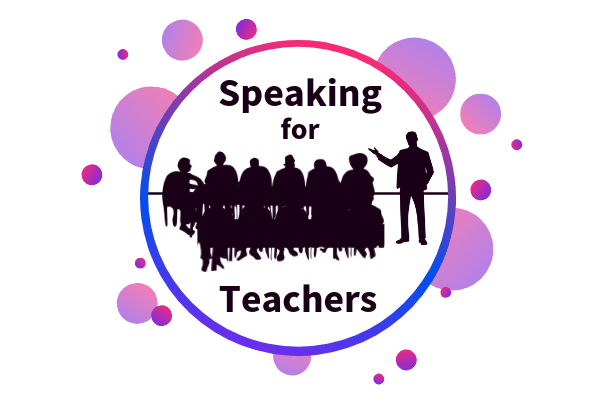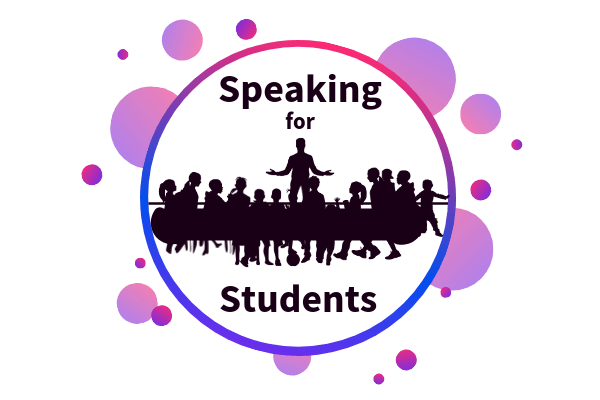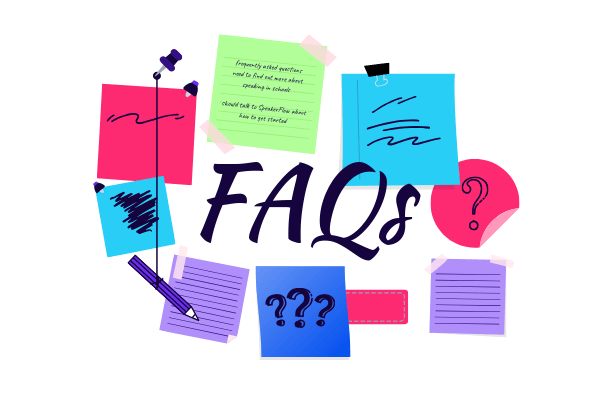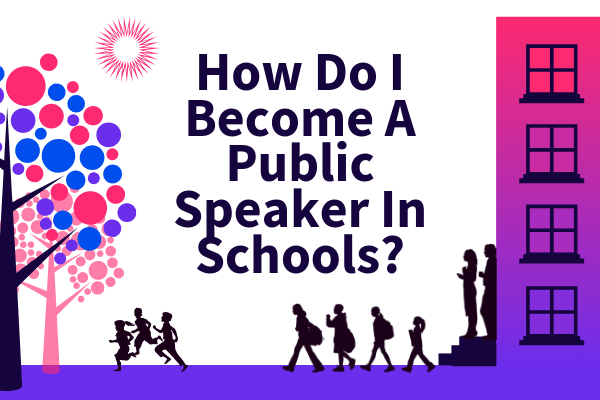One of the greatest things about working in the speaking industry is the impact you can have on your audience. So, what better audience than those already primed for learning? Enter anyone looking to become a speaker in schools. 👏
Speaking in lower level education is not only a great way to impact people at a young age. It’s also a foolproof way to expand your audience range in age, location, and perspective. After all, every generation has different experiences and, as a result, different strengths and weaknesses to bring to the table. By sharing your knowledge with young people, you offer your strengths and weaknesses as learning tools for them. Additionally, you have the opportunity to learn from them in return.
So, what does it take to get started as a speaker in schools? Let’s break it down one step at a time, namely by addressing the following:
How do I become a speaker in schools?
To begin with, the process for becoming a speaker in schools can vary greatly depending on your desired audience. We already touched on the impact you can have speaking to students. However, there are also a ton of adults in lower level education that can benefit from your message. These men and women include the teachers, human resources representatives, and even school nurses that keep our schools running smoothly.
Below, we’ll cover some of the benefits of speaking in schools, for students and teachers, as well as some relevant problems facing the American education system in this day and age (that you can help solve!). We’ll also walk through some tips and tools for finding speaking gigs in schools, depending on your audience.
Speakers for School Teachers

Let’s start with speaking for teachers. First and foremost, speaking for adults is an entirely different process than speaking for children. For one thing, you will likely be expected to have a higher level of education yourself. Whether these accolades are honorary or not, your experience and education will matter more in an audience of adults than it ever will with kids.
Second, you’ll also be considering an entirely different set of emotions when you’re speaking for teachers. Therefore, the issues, examples, and current events you choose should generally be more serious and your message more actionable. Inspiration can be found everywhere, from digital newsletters to your local news. Some of the more commonly cited problems in U.S. schools are summarized in “10 Challenges Facing Public Education Today” from the National Education Association. Another comes from the New York Times article, “How Much Wealthier Are White School Districts Than Nonwhite Ones? $23 Billion, Report Says”.
If you want to be sure you’re addressing issues specific to schools in your area, talk to the teachers themselves! Interview local educators, over a coffee or virtually, to get an inside look at the problems they’re facing. After all, you could have the solution they’ve been looking for!
Not sure which schools are the highest priority? No worries – We’ll cover some tools for that shortly.
Speakers for Elementary and Middle Schools
But before we jump into tools for becoming a speaker in schools, let’s talk about audience #2: the students. Speaking for kids in elementary and middle school is much different than speaking for teachers. Although it may not require as much education or qualifications on your end, kids are more difficult to keep engaged.

In short, while you can use the same processes for outreach, regardless of your desired audience, your speaking style between the two groups will differ. Surprise, surprise, right?
Another not so shocking tip for speaking for students is to make it funny! According to Edutopia’s article “Using Humor in the Classroom” “humor reduces stress and tension… improves retention of information, and promotes creative understanding. But most of all, it brings a sense of pleasure and appreciation and creates a common, positive emotional experience”. The same is true for special presentations to students, like yours.
However, if humor isn’t one of your strong suits, there are many other ways to keep kids engaged. If you haven’t spoken for children before or need a few reminders, take a minute to scan “20 Ways to Keep Your Students’ Attention” by Rachel Lynette. An educator herself, Lynette is a great resource not only when it comes to keeping kids engaged but also for insight into teachers’ challenges in lower level education. Check out her blog to learn more.
Lastly, for additional inspiration for speaking in schools, take a look at youth speakers Josh Shipp, David Edward Garcia, and Fabian Ramirez. All three are highly rated and serve as perfect examples for using humor in delivering powerful messages to young audiences.
Tools for Finding Speaking Gigs in Schools
Now that we’ve covered the basics of starting as a speaker in schools, let’s talk tools. At the basic level, outreach to school faculty is always a smart move. Ballotpedia’s list of school districts in the U.S. and ElementarySchools.org are awesome resources for building a prospective list of schools. As you start reaching out, it’s also good to keep the size of the school in mind so you can predict who generally acts as the decision-maker. Grant Baldwin over at the Speaker Lab put it nicely in his 50th podcast episode when he said “The smaller the school, the more likely it’s the principal. The bigger the school, the more likely, it’s someone else…but it’s almost always the principal.” That said, this can differ with the geographic area and income of the school. As a result, you may need to adjust your sales and outreach process as you go.
On the flip side, if your goal is speaking for adults, there are a ton of additional sources for gigs. Some examples include the National Association of Elementary School Principals (NAESP), the Association of American Educators (AAE), and the Society for Human Resource Management (SHRM). While the NAESP and the AAE provide insight into educators’ challenges, the SHRM is especially helpful. Its speakers bureau focuses on a number of topics that are especially relevant in education today, such as inclusion and diversity, so, if you’re positioned to join a bureau, it’s definitely worth a look.
Finally, regardless of your audience, the Speaker Intel Engine is a tried and true tool for finding speaking gigs. Constructed by professional speaker Sam Richter, it’s an easy and affordable way to find schools or educational conferences to prospect. It’s also reasonably priced, so if you’re concerned about the return on investment from a bureau, this is a solid way to ensure consistent leads for you and your team.
Top School Motivational Speakers on YouTube
Not sure where to start as a beginner speaker in schools? Already speaking in schools and looking to enhance your game? Check out the following TED Talks for some inspiration, both in terms of content and speaking techniques, and some insight into some of today’s hot topics in education.
As a side note, if you don’t already know what TED Talks are, check out, “What Is A TED Talk? The Fundamentals of TED Explained” for an introduction to TED and another collection of incredible speeches.
“Let’s teach for mastery — not test scores” by Sal Khan
First on the list is CEO and founder of Khan Academy Sal Khan. Although Khan himself has three degrees from MIT and an MBA from Harvard (wow!), he argues about the value of allowing students to learn in their own way and at their own pace. He says, “if you got 20 percent wrong on something, it doesn’t mean that you have a C branded in your DNA somehow. It means that you should just keep working on it.” Click below to hear more.
“Do schools kill creativity?” by Sir Ken Robinson
Next is author, educator, and Warwick University professor Sir Ken Robinson. In this 20-minute TED Talk, Robinson asserts that “Our education system has mined our minds in the way that we strip-mine the earth for a particular commodity. And for the future, it won’t serve us. We have to rethink the fundamental principles on which we’re educating our children.” In the video below, learn more about these principles and how you can contribute to restructuring our world’s education.
“Every kid needs a champion” by Rita Pierson
My favorite of these five videos, the following clip is from counselor, assistant principal, and legendary educator Rita Pierson. Although Pierson passed away a month after this speech, she left behind a legacy best summarized in her trademark phrase “Every kid deserves a champion.” See below for more timeless advice for educators and speakers alike.
“How to fix a broken education system … without any more money” by Seema Bansal
Fourth in the list is a breathtaking story from the director of Boston Consulting Group’s Social Impact practice in India, Seema Bansal. In the video below, Bansal describes her team’s efforts to improve public education in central India. Rather than focus on the students, she describes how they had to first help the teachers and how, by doing so, they created an increase in student retention and happiness. Bansal ends her speech by saying, “Can government systems transform? I certainly believe so. I think if you give them the right levers, they can move mountains.” Click below to learn how.
“How America’s public schools keep kids in poverty” by Kandice Sumner
Last but certainly not least in the list is a moving TED talk from Boston Public School teacher Kandice Sumner. Having attended Boston Public Schools as a child, Sumner was part of a desegregation program that ultimately showed her the extreme differences in the quality of education and learning materials afforded white students compared to her African American counterparts. Here, she argues, “It’s not an achievement gap. It’s an education debt, for all of the foregone schooling resources that were never invested in the education of the black and brown child over time.” Learn more about her experience, inspiration, and drive as an educator in the clip below. I can promise the 14 minutes you’ll spend watching is 100% worth it.
Other Frequently Asked Questions
What is a youth motivational speaker?
A youth motivational speaker is exactly what it sounds like: a speaker that speaks to and motivates youth. Done and done.
How much do youth motivational speakers make?

The pay scale for youth motivational speakers varies with the size of the school and whether it’s a public or privately-funded school, among other factors. As a general rule, private schools have larger budgets and so can pay more for a given gig. Public schools, on the other hand, although they may pay less for a single gig, may be able to hire you for multiple events within their district, paying you a greater total in the long run.
Additionally, depending on your area of expertise, corporate sponsorships may be an option. For example, if you’re a sports speaker presenting at a school with a sports-heavy budget, you could negotiate sponsorships from popular athletic companies to mention their brand in your speech. Depending on the school, the age range of your audience, and the company in question, it may be in your interest to at least ask.
What do speakers in schools generally talk about?
Although the material of speakers in schools may vary, generally, it focuses on relevant issues facing the youth in the area. These may include the issues we discussed previously. However, as always, these problems (and the corresponding speech material) will differ based on current events, geographic location, and other localized factors. You’ll always find insights by researching news around the venue location and using the handy dandy tools we outlined above.
Speakers in schools also tend to focus on nationwide issues facing youth. In the US., some common examples include mental health or the declining number of high school students that opt for trade school. Ultimately, the topic you choose depends on the venue, the location, and how you can best help the students or teachers you seek to inspire.
For more information about becoming a speaker in higher-level education, check out our companion blog to this one, entitled “How Do I Become A Public Speaker At Colleges & Universities?”. 👍





